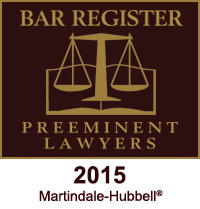
Allison MacKenzie, Ltd. has been named one of the 2015 Top Ranked Law Firms by LexisNexis
 Allison MacKenzie, Ltd. has been named one of the 2015 Top Ranked Law Firms by LexisNexis® Martindale-Hubbell®. Martindale-Hubbell® was asked to research their comprehensive database of over 1.2 million lawyers and firms in over 160 countries and identify U.S. law firms of 10 or more attorneys, where at least one out of three of their lawyers achieved the AV Preeminent® Peer Review Rating. This rating indicates the rated lawyer has been deemed by his or her peers to have demonstrated the highest level of ethical standards and legal ability.
Allison MacKenzie, Ltd. has been named one of the 2015 Top Ranked Law Firms by LexisNexis® Martindale-Hubbell®. Martindale-Hubbell® was asked to research their comprehensive database of over 1.2 million lawyers and firms in over 160 countries and identify U.S. law firms of 10 or more attorneys, where at least one out of three of their lawyers achieved the AV Preeminent® Peer Review Rating. This rating indicates the rated lawyer has been deemed by his or her peers to have demonstrated the highest level of ethical standards and legal ability.
 Additionally, Allison MacKenzie, Ltd. has been recognized for their legal expertise and professional stature by placement in the Martindale-Hubbell® Bar Register of Preeminent Lawyers™. For over 90 years, the Bar Register has been a unique guide to the legal community’s most eminent professionals. It includes only those select law practices that have earned the highest rating in the Martindale-Hubbell Law Directory and have been designated by their colleagues as preeminent in their field.
Additionally, Allison MacKenzie, Ltd. has been recognized for their legal expertise and professional stature by placement in the Martindale-Hubbell® Bar Register of Preeminent Lawyers™. For over 90 years, the Bar Register has been a unique guide to the legal community’s most eminent professionals. It includes only those select law practices that have earned the highest rating in the Martindale-Hubbell Law Directory and have been designated by their colleagues as preeminent in their field.
Martindale-Hubbell is the facilitator of a peer review rating process. Ratings reflect the anonymous opinions of members of the bar and the judiciary. Martindale-Hubbell® Peer Review Ratings™ fall into two categories – legal ability and general ethical standards. To learn more about Martindale-Hubbell Peer Review Ratings, please visit www.martindale.com/ratings.
By Thoran Towler, Allison MacKenzie, Ltd.
A common, but avoidable pitfall in any business is the classification of workers – independent contractor or employee. This blog entry seeks to clarify the distinction between employees and independent contractors and to serve as a helpful guide in making this very important determination.
An independent contractor is a self-employed person who agrees with a client to complete work for a fee according to the means or methods of the self-employed person. The self-employed person is not subject to the supervision or control of the client, except as to the result of the work. A good example of this type of scenario is the relationship between a contracted cleaning company and a law firm. A law firm will often contract out the work of cleaning the offices to an independent cleaning company. These cleaners usually come to the law firm after business hours, work without supervision and leave when they believe the work has been completed. The cleaners are obviously independent contractors. However, in regards to the other workers in the office (i.e. receptionist, office administrator, legal assistant, etc.) this same relationship does not exist. These workers are considered employees of the law firm, not independent contractors. Employers often want to know how to make the distinction between employee and independent contractor when the difference between the workers isn’t so clear.
The main distinction between employees and independent contractors is the level of control. The factors to be considered in understanding this distinction generally fall into three categories: behavior, financial, and relationship. Each factor must be weighed to determine the kind of relationship that exists and the liability of each party in that relationship. No factor is more important than any other. The relationship must be considered as a whole.
Behavior
Behavior refers to facts that show whether there is a right to direct or control how the work is done. This includes the type of instruction given (i.e. when and where to do the work, what equipment to use, etc.), the degree of instruction (how detailed are the instructions), evaluation (whether the work is evaluated based on how the work is performed versus the result), and training (if training to do the work is provided or not).
Financial
Financial refers to facts that show whether or not there is the right to control the economic aspects of the worker’s job. This includes the significance of the investment (whether the worker has to make a significant investment in the tools used to complete the work), unreimbursed expenses (expenses incurred regardless of whether work is currently being performed), the opportunity for profit or loss (the possibility of incurring a loss is directly tied to the work), services available to the market (whether the worker can pursue other work), and the method of payment (payment of hourly, weekly, or monthly wages versus a flat fee).
Relationship
Relationship refers to facts that show how the worker and business perceive their relationship to each other. This includes written contracts (how the parties have defined their relationship), employee-type benefits (whether the worker receives insurance, retirement, vacation, etc.), permanency of the relationship (whether the employment is project-specific or for an indefinite period of time), and services provided key to the business (whether the work becomes part of/owned by the business or not).
Why is this determination important? There are very serious consequences if an employee is misclassified as an independent contractor with no reasonable basis for doing so. The most significant consequence is that the business may be liable for any and all employment taxes of that worker for the length of their employment (26 U.S.C. § 3509). There may also be penalties and fines assessed by the U.S. Department of Labor for failing to pay proper overtime compensation, unemployment insurance taxes or workers’ compensation premiums. Also, if the Nevada Labor Commissioner’s office finds that you misclassified employees, you are guilty of a misdemeanor.
Take some time to think about how you interact with the independent contractors you encounter in your professional life and be mindful of the level of control. The level of control exerted is a primary factor a court will look at if you find yourself defending a claim for misclassification.
If you have any questions or are interested in speaking with me about independent contractors, please feel free to E-mail me at [email protected].
By Joan Wright, Allison MacKenzie, Ltd.
The Nevada Revised Statutes (NRS) require that every corporation have a Registered Agent who resides or is located in the State (NRS 78.090) and that every limited liability company have a Registered Agent with a street address for the service of process which is the registered office of the company in this State (NRS 86.231). Nevada adopted the Model Registered Agents Act in 2007 and it is Chapter 77 of the NRS applicable to Registered Agents for both corporations and limited liability companies. There are two types of Registered Agents: Commercial Registered Agents and Noncommercial Registered Agents. A Commercial Registered Agent must make annual filings with the Nevada Secretary of State and maintain certain information on file with that office. Allison MacKenzie, Ltd., is a Commercial Registered Agent.
A Registered Agent is required under NRS Chapter 77 to forward to the represented entity any process, notice or demand served on the agent on behalf of its client; and to provide the notices of any change in the Registered Agent’s name, address or type or jurisdiction of organization or if it has elected to cease being in the business of acting as a Registered Agent.
With respect to any particular corporate client, the Registered Agent is required to keep in its file: a certified copy of the Articles of Incorporation and all amendments thereto; a copy of the corporate bylaws certified as accurate by an officer of the corporation, and all amendments thereto; and a stock ledger or duplicate stock ledger, revised annually, containing names alphabetically arranged, of all persons who are stockholders, their place of residence, if known, and the number of shares held by them OR a duplicate stock ledger, and the present and complete mailing or street address where the stock ledger or duplicate stock ledger is kept.
The corporation can be fined if the records specified are not kept by the Registered Agent or provided to stockholders who make a proper request during business hours. A reasonable fee for making copies may be charged. An affidavit to the effect that the inspection of corporate records is not desired for a purpose which is in the interest of a business or object other than the business of the corporation and that the stockholder or other person has not at any time sold or offered for sale any list of stockholders of any domestic or foreign corporation or aided or abetted any person in procuring any such record of stockholders for any such purpose may be required before records are inspected.
Registered Agent for any particular limited liability client which does not maintain an office in Nevada for its records shall keep a statement setting out the name of the custodian of the information required by statute to be kept in the State including the custodian’s complete address, with street and number.
What does Allison MacKenzie, Ltd. Do as Registered Agent?
In addition to the minimum statutory requirements set out above in summary form, Allison MacKenzie, Ltd. also forwards all first class mail received for the entity as requested by the client and assures that annual filings by the client comply with the client’s organizational documents and the requirements of law. Allison MacKenzie, Ltd. provides a meeting space for clients to hold their annual meeting or special meetings.
If you have any questions or are interested in speaking with me about Registered Agents, please feel free to E-mail me at [email protected].
Volunteer Attorneys for Rural Nevadans (VARN) has recognized Joan C. Wright as Outstanding Volunteer for her service to the 2014 Pro Bono Project. Joan participated in the Lawyer in the Lobby program set up by VARN which allows citizens to sit down with an attorney for a short amount of time and have questions answered at no charge to them.
Joan Wright has been in practice in Nevada since 1979 and has concentrated her work in real estate law, resort timeshares, community associations, secured transactions, secured creditors (bankruptcy), easements and quiet title. She received her undergraduate degree from the University of California at Berkeley and her law degree from the University of the Pacific, McGeorge School of Law.
By Dawn Ellerbrock, Allison MacKenzie, Ltd.
The importance of a health care power of attorney form and a living will declaration as part of your overall estate plan cannot be overemphasized.
A power of attorney form for health care decisions allows you to name someone to act on your behalf for the purpose of making medical decisions if you are unable to make informed decisions for yourself. The Nevada Legislature has enacted a statutory form entitled “Durable Power of Attorney for Health Care Decisions” at NRS 162A.860. Nevada’s Durable Power of Attorney for Health Care Decisions authorizes the named attorney-in-fact to consent to medical procedures on your behalf if you are unable to give informed consent. Nevada’s Durable Power of Attorney for Health Decisions, however, does not authorize the named attorney-in-fact to consent to such things as convulsive treatment, psychosurgery, or your commitment or placement in a facility for treatment of mental illness. A court order is needed for these types of medical decisions.
With respect to decisions to withhold or withdraw life-sustaining treatment, Nevada’s Durable Power of Attorney for Health Care Decisions sets forth five different statements of desire. If you agree with the statements of desire, then you would initial the statement. The five statements are as follows:
- I desire that my life be prolonged to the greatest extent possible, without regard to my condition, the chances I have for recovery or long-term survival, or the cost of the procedures.
- If I am in a coma which my doctors have reasonably concluded is irreversible, I desire that life-sustaining or prolonging treatments not be used. (Also should utilize provisions of NRS 449.535 to 449.690, inclusive, if this subparagraph is initialed.)
- If I have an incurable or terminal condition or illness and no reasonable hope of long-term recovery or survival, I desire that life-sustaining or prolonging treatments not be used. (Also should utilize provisions of NRS 449.535 to 449.690, inclusive, if this subparagraph is initialed.)
- Withholding or withdrawal of artificial nutrition and hydration may result in death by starvation or dehydration. I want to receive or continue receiving artificial nutrition and hydration by way of the gastrointestinal tract after all other treatment is withheld.
- I do not desire treatment to be provided and/or continued if the burdens of the treatment outweigh the expected benefits. My agent is to consider the relief of suffering, the preservation or restoration of functioning, and the quality as well as the extent of the possible extension of my life.
Admittedly, the language used in the foregoing statements is confusing. Unfortunately, Nevada law mandates that this language be used. It is advisable that you review the statements of desire with your doctor or attorney if you should have any questions.
Additionally, if you agree with the items 2 and 3 of the statements of desire regarding end-of-life decisions, Nevada law encourages the use of a Living Will Declaration.
A Living Will Declaration goes with the Durable Power of Attorney for Health Care Decisions. If the persons you have named as your attorneys-in-fact are unable or unwilling to make end-of-life decisions on your behalf, the Living Will Declaration authorizes your attending physician to make such decisions for you.
If you have any questions or are interested in speaking with me about a Durable Power of Attorney for Health Care Decisions and Living Will Declaration, please feel free to E-mail me at [email protected]
 Charles P. Cockerill joined Allison MacKenzie Law Firm on November 1st, 2014. With over 20 years of practice exclusively in the area of Labor and Employment Law, Charlie brings a wealth of knowledge and proficiency representing employers including cities, counties, school districts, hospitals, public communications utilities, and others. Further, Charlie is an arbitrator for the Nevada District Court Alternative Dispute Resolution (ADR) program and a State of Nevada Hearings Officer in matters involving employee discipline and discharge. In his free time, Charlie enjoys spending time with family and friends, traveling, snowboarding and golfing. Charlie is taking the lead in expanding the firm’s practice in Labor and Employment Law for both the public and private sector employers including: collective bargaining, Federal mediation, grievance hearings, arbitration and appeals, wrongful termination, Americans with Disabilities Act, sexual harassment, Family and Medical Leave Act, non-competitive agreements, wage claims and fair labor standards.
Charles P. Cockerill joined Allison MacKenzie Law Firm on November 1st, 2014. With over 20 years of practice exclusively in the area of Labor and Employment Law, Charlie brings a wealth of knowledge and proficiency representing employers including cities, counties, school districts, hospitals, public communications utilities, and others. Further, Charlie is an arbitrator for the Nevada District Court Alternative Dispute Resolution (ADR) program and a State of Nevada Hearings Officer in matters involving employee discipline and discharge. In his free time, Charlie enjoys spending time with family and friends, traveling, snowboarding and golfing. Charlie is taking the lead in expanding the firm’s practice in Labor and Employment Law for both the public and private sector employers including: collective bargaining, Federal mediation, grievance hearings, arbitration and appeals, wrongful termination, Americans with Disabilities Act, sexual harassment, Family and Medical Leave Act, non-competitive agreements, wage claims and fair labor standards.
By Mike Pavlakis, Allison MacKenzie, Ltd.
The relationship between landlord and tenant is an important one, and should be documented by a written rental agreement signed by both of the parties.
The rental agreement should identify the premises (the apartment, unit, house, or other property) which is the subject of the rental agreement, and it should include at least the following:
- The commencement date that the rental agreement begins; the date that the tenant can take occupancy of the premises, and the date the rental agreement ends;
- The amount of the monthly rent; the date the rent is due, and the place it is to be paid; typically, rents are paid in advance;
- The amount of any late charge if the rent is not paid when due;
- The amount of any security deposit; when it is to be paid, and whether the security deposit is refundable at the end of the term of the rental agreement, with or without interest;
- The utilities and services, if any, provided by the landlord, and the utilities for which the tenant is responsible; in residential tenancies, the landlord typically provides water and sewer service and perhaps trash removal and the tenant is responsible for electricity, heat, phone, internet service;
- The names of the tenants who will occupy the unit and who are responsible for the rent; and if any pets are allowed, the number and type of pet;
- The name, address, and contact information of the landlord in case of emergencies;
- The responsibility for the payment of taxes and insurance;
- The process for renewal of the rental agreement.
In addition, it is important for the parties to conduct a “walk through” of the unit prior to the tenant taking occupancy. Any deficiencies, such as carpet burns, holes in walls, broken windows, window coverings, scratched fixtures and appliances, and any work to be done by the landlord should be noted. Ideally, photographs of the condition of the unit will be taken. These should be dated and if necessary compared to the results of a “walk through” inspection of the unit upon termination of the rental agreement.
Standard forms of rental agreements are available in office supply stores and online. If you need help in preparing or reviewing your rental agreement, please call one of our attorneys. A well documented landlord tenant relationship will help insure a mutually satisfactory relationship and help avoid problems upon termination of the term of the agreement.
If you have any questions or are interested in speaking with me about written rental agreements, please feel free to E-mail me at [email protected]
 Thoran Towler has become an associate of the firm as of January 20, 2015.
Thoran Towler has become an associate of the firm as of January 20, 2015.
Prior to joining Allison MacKenzie, Thoran was the State of Nevada Labor Commissioner appointed by the Director of the Department Business and Industry in 2011. Thoran brings an expertise in the areas of wage and hour, labor and employment law, union issues, prevailing wage and public works. Additionally, Thoran has a proven track record of engaging with the Nevada business community, including conducting numerous trainings on wage and hour compliance with small business groups.
Thoran Towler was admitted to practice law in the State of Nevada in 2006 after obtaining his law degree from Gonzaga University School of Law. Thoran has a Bachelor of Science in Technology from Walla Walla College.
By Joel W. Locke, Allison MacKenzie, Ltd.
Black’s Law Dictionary defines “Probate” as the judicial procedure by which a testamentary document is established to be a valid will; the proving of a will to the satisfaction of the court.
If a decedent dies without a will, that person is said to have died intestate. When a person dies intestate and leaves assets subject to administration, those assets will be subject to court administration and will be distributed pursuant to the laws of intestate succession outlined in NRS Chapter 134. The probate and intestate administration process is nearly identical and depending on the size of the estate, will have different time-lines and requirements.
There are four (4) levels of probate in Nevada that are categorized by the size of the estate and the type of assets contained in the estate: $1-$20,000; $20,001-$100,000; $100,001-$200,000; and $200,001 and above.
If a decedent leaves no real property and their personal property subject to probate does not exceed $20,000, no formal probate is necessary and the estate can be distributed pursuant to an Affidavit showing the right to the personal property.
The next level of probate is called a “Set-Aside” and applies to estates that do not exceed $100,000. This is an informal type of probate where no Personal Representative is appointed, and instead, the Court will set-aside the decedent’s assets to the appropriate beneficiaries by issuing an order. If the decedent leaves minor children or a surviving spouse, the entire estate will be set aside to them, without paying creditors of the decedent. If there are no minor children or surviving spouse, the creditors will be paid a pro-rata share of any claims and the rest of the estate will be distributed to the beneficiaries.
The next type of probate is called a “Summary Administration” and applies when the decedent’s estate does not exceed $200,000. This is a more formal probate and a Personal Representative is appointed and creditors are notified and have sixty (60) days to file a claim against the estate, or the claim is barred. The Personal Representative is required to file an inventory of the estate, and after the notice to creditors time period has expired, is required to file an account of the estate and request distribution pursuant to the will, or intestate succession.
The final form of probate is known as a “Full Administration.” The same requirements for the Summary Administration must be met, except that the notice to creditors is a ninety (90) day period.
Probate is a time consuming and costly process. A full administration usually takes at least nine (9) months, but often takes longer than a year. Court fees, publication fees, and attorney fees for a full administration often exceed $10,000, and based upon the value of the estate, can be much, much more. There are many ways to avoid probate, but it requires careful planning based upon each individual’s assets and desires.
If you have any questions or are interested in speaking with me about creating an estate plan that reflects your desires, please feel free to E-mail me at [email protected] and I will set up a consultation with you.
Volunteers for Rural Nevadans (VARN) have recognized Chris MacKenzie and Ryan Russell for outstanding service to the 2013 Lawyer in the Lobby Project. Lawyer in the Lobby is a program set up by VARN that allows citizens to sit down with an attorney for a short amount of time and have questions answered at no charge to them.
Chris MacKenzie has been in practice in Nevada since 1993. He received his undergraduate degree from the University of Nevada Reno and his Juris Doctor from the University of Idaho
Ryan Russell began practicing in Nevada in 2003. He received his undergraduate degree from the University of Nevada Reno and his Juris Doctor from the University of Nevada, William Boyd School of Law.




